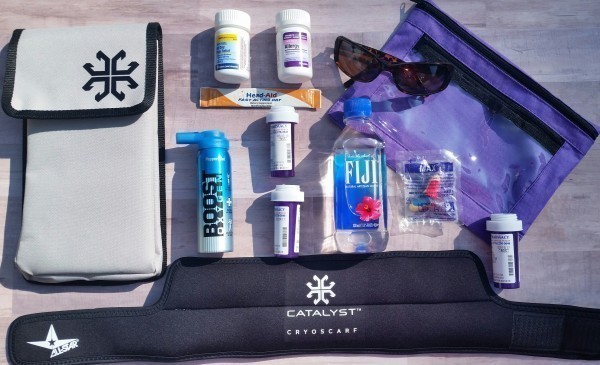
I assumed the most difficult part about parenting was hauling 3 impatient kids: ages 9, 2 years old and 6 months old, unwillingly into the grocery store because I absently minded forgot the milk for everyone's morning cereal.
Little did I know that was going to be the easiest part of my role as a mom.
When my middle child developed abdominal migraine that was chronic, I wasn’t exactly sure how I could help him. Yes, I too had chronic migraine, but my symptoms completely differed from his. Also, most of what worked for me wasn’t recommended for children.
For those who don’t know the severe implications of living with the migraine disease could do to a person, my son is the perfect example of that. He went from an active child that enjoyed reading comic books and novels to a person suffering from pain in his stomach or head along with constant nausea, sensitivity to lights, sounds, and noises. His health became so frail he was completely bedbound for almost 3 months.
I often feared that my child would miss out on so many of the things a child his age should be enjoying. And what if he couldn’t attend the same things his classmates could? How could we manage him staying through an entire event when chances are one of his many migraine triggers would rear its ugly head and cause him to be completely debilitated.
I learned a whole new level of multitasking skills I never knew existed. Ones that had me being incredibly organized and quickly excute a plan for each unique situation.
Welcome to the world of being a parent of a child living with a debilitating medical condition where you have no idea what is going to be in store for you until the very second it happens.
I was now an owner of an oversized purse that includes necessities to help my child during his medical emergencies.
In my 4 years’ experience of helping my son manage his abdominal and chronic migraine, I’ve come across various scenarios that would seem frustrating to most, but to me, it’s just another day in the life of my chronically ill child. With all my careful planning, I was able to compile a helpful guide that has been successful for our family and could navigate other parents facing similar issues.
Test out how your child will adapt to a more controlled environment
Start out small, like a family gathering. Usually, your family will be the first ones to know about your child’s current health status and if not help your kid tell them. Not being afraid to speak openly about a medical condition can help build your youth’s confidence. Always make sure to ask the host immediately after your arrival, where a possible place would be for your child to rest in the event they unexpectedly become ill. Some people require a dark room or for it to be quiet. Make sure your kids medical emergency bag contains sunglasses or an eye mask and a pair of earplugs.
Once you know how your child does in this type of situation, you could let them attend a classmate’s celebration, but remember to let the host of the party know your child has a treatment protocol and it needs to be readily available to them if a medical crisis arises. Depends on the age of your child, asking to join in the day's festivities might be an option or staying within a certain mile radius in case you’re needed for additional assistance is also ideal.
Movie Theaters
On occasion, the combination of amazing 3D graphics and loud sounds, has triggered my son to have a migraine attack. That’s why opting for the traditional theater experience might be more in your child’s favor.
Outdoor Concerts
We attended my son’s first outdoor concert a year after his chronic migraine diagnosis. I was hesitant to go but knew we had our vehicle parked nearby if we needed to exit in a quick manner. Plus, the music is a different type of decibel which makes it less strenuous on your eardrums.

Remember to scout out all the nearby restrooms, or in this case, porta potty locations and ask if they have a first aid tent. Also, carry along an umbrella or small blanket as a proper way to shade your child against the sun or to block anyone from seeing them throw up in public. Kids tend to easily embarrassed. This will make them feel a little more at ease.
Arcades
With all of the flashing lights and louds sounds, I've found that having my son take short breaks to walk outside for 5 minutes of fresh air, about every half hour, was of tremendous help to him. This could easily grant your child extra hours of arcade fun and that's all you want for them; especially if it's during a friend's birthday party.

Amusement and Water Parks
These are common places we visit as a family and know the entire layout of where the restrooms and first aid station are. Do keep in mind the noise usually echoes in these types of environments.
I also know the carry-in policies by checking their website. When something is medically necessary, places like these are less likely to give you any issues. If you are concerned about their policies, contact their offices to ask questions. In the event your child becomes too ill to walk, wheelchairs are often easy to come by.
Arenas for Sporting or Concert Events
Missing out on a professional team your child routes for or band they know every song word for word, is worth every effort to make sure they get to attend.
A few months back, my son and I received tickets to see Coldplay in Minneapolis. The month leading up to the concert, I looked up U.S Bank Stadium’s website and read through the policies pertaining to carry-ins and medically necessary items. I discovered that this venue only allowed the bigger carry in bags to clear which meant I had to find one to bring all my kid’s medical emergency items. Each guest was allowed (1) 12oz. of factory sealed water and no cooler bags were allowed. My son needs to have his Cryoscarf (A head wrap that once it’s frozen, has long-lasting gel packs) easily accessible to him. Luckily, we were able to get an insulated carry sleeve that met the stadium's requirements. All medications are welcomed if they are in their proper labeled bottles. No pill boxes or zip lock bags or security will toss them.

Another perk to visiting a stadium, is they tend to have apps available to download on your cellular devices. I was able to view our seats, along with each restroom location. I also noted the first aid station nearest us and learned you could text for help and an attendant will come to your location to assist you.
Again, if you have any questions about your trip, email the venue to get those answered.
I know how overwhelming it is to be a parent and caretaker of a chronically ill child, but in the end, it’s all worth the effort for our children to have every opportunity to create as many wonderful childhood memories, as they possibly can.
This post comes from the TODAY Parenting Team community, where all members are welcome to post and discuss parenting solutions. Learn more and join us! Because we're all in this together.
